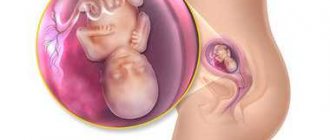Based on the hCG content, it is possible to identify the correct formation of the child’s body at the initial stages of fetal formation and the fading of pregnancy .
This substance begins to be produced after the attachment of an already fertilized egg. When the baby develops without disturbances, hCG increases every day and reaches its maximum volume by the third month of pregnancy, gradually decreasing thereafter.
When the vital activity of the fetus freezes, the volume of the above substance decreases sharply and differs from normal, and this is a pathology.
HCG in the early stages of fetal death
In the early stages of pregnancy, it is extremely difficult to calculate a frozen one. The reason for this is the ability to diagnose fading pregnancy only a few weeks after the death of the fetus.
Only after this time do symptoms of fading pregnancy begin to appear. It is not yet possible to listen to the fetal heartbeat and you can accurately find out about the pathology using this analysis. For this reason, it is possible to diagnose fading pregnancy before the appearance of the first symptoms only after a blood test for hCG.
When diagnosing interruption of fetal development in the initial months, the concentration of the hormone stops growth. If a woman has taken the test more than once, the results may be lower than previous ones. During a normal pregnancy and a healthy fetus, the hormone level increases gradually and in accordance with the norms. However, there is no exact data on what exact concentration of hCG at a certain stage of pregnancy indicates its fading. It is necessary to monitor the dynamics of indicators, since each woman’s body is individual.
Fading pregnancy is a pathology. There are a number of reasons that can lead to it:
- hormonal imbalance;
- lack or excess of sex hormones of a certain type;
- infectious diseases;
- genetic abnormalities;
- increased blood density;
- use of certain medications;
- alcohol consumption;
- smoking;
- prolonged exposure to heat;
- hypothermia.
Indications for the determination of human chorionic gonadotropin
Women routinely donate blood for hCG during pregnancy. This allows you to assess the condition of the fetus and draw conclusions about its development.
But there are cases when there is a need to additionally determine the hormone level:
- The occurrence of bloody.
- Acute, especially cramping in nature.
If the above symptoms occur, you should go to the hospital for further examination and treatment. To make a correct diagnosis, it is necessary to take into account how hCG decreases during a frozen pregnancy. There may not be a rapid decrease in the amount of hormones; there is a lack of growth and slight negative dynamics.
Additionally, ultrasound is used to determine the size of the fetus and the presence.
Symptoms of frozen pregnancy at 5 weeks
Already in the fifth week, with the help of a hCG study, it is possible to track the fading of fetal development, if the woman has already been tested before. If not, then studying the level of hCG will not be able to give accurate results , since the increase in the concentration of the hormone in the blood during pregnancy may increase slightly over some time.
But in this case, after a few weeks, the woman may notice symptoms of a frozen pregnancy:
- abdominal pain;
- discharge with blood;
- absence of fetal movements (at later stages);
- lack of heartbeat in the child;
- disappearance of toxicosis and other symptoms of pregnancy.
If a woman has noted the above signs of a frozen pregnancy , then she should immediately consult a doctor, since if a pregnancy fails at this stage, an abortion is necessary for medical reasons.
How to interpret an hCG analysis during a frozen pregnancy?
Human chorionic gonadotropin is an important indicator of a successful pregnancy.
The hormone is produced by the chorion, regulates a woman’s hormonal levels, and creates favorable conditions for the development of the fetus.
This analysis should not be neglected.
The doctor should decipher the meanings, but it will also not be superfluous for you to familiarize yourself with the information first.
The concept of normal in different laboratories differs, so do not be nervous if the indicators are too high or vice versa.
In the first trimester, the hCG level increases every two days, at 7-10 weeks there is a peak increase in levels, and then it decreases.
Levels:
1-5 weeks – doubling of indicators every two days to 1500;
5-13 weeks – doubling of indicators every three to four days up to 60,000;
13-18 weeks - every four days the indicators decrease to 35,000.
A non-developing (frozen) pregnancy means that the fetus has died. This pathology can be diagnosed using analysis. The hormone level drops, but the study should be carried out over time so that the doctor can evaluate the indicators. If there is a suspicion of a frozen pregnancy, the doctor will additionally prescribe an ultrasound.
Too tall
Causes of excessive growth of hormone levels:
- Multiple pregnancy: the more babies, the higher the rates. The increase will also be rapid depending on the week.
- Incorrect calculation of deadlines. The hormone grows very quickly in the early stages, so even an error of 5-7 days will be enough for an incorrect interpretation.
- Early toxicosis. With this condition, a woman’s indicators increase moderately.
- Down's disease in a child. The cause is not fully understood, but an increase in the hormone, together with other studies, helps to identify the disease.
- Diabetes mellitus in a pregnant woman.
- Taking synthetic gestagen drugs.
Short
Lack of hormone growth occurs for the following reasons:
- ectopic pregnancy;
- fetal freezing;
- risk of miscarriage;
- delayed fetal development;
- placental insufficiency;
- carrying a child to term.
HCG levels increase
A decrease in the level of this hormone during frozen pregnancy is most common. This usually indicates the development of pathology even before other symptoms appear. But, in some cases, it is not possible to find out about the problem by measuring the hormone level. The reason for this phenomenon lies in the individuality of each woman’s body.
Some experience an increase in hCG levels even after the pregnancy has died out. However, if we take into account the table of normal hormone concentrations depending on the duration of pregnancy, the increase in human chorionic gonadotropin during the cessation of fetal life is much less pronounced.
Can hormone levels increase during ST?
Since episodes have been described when the gonadotropin level increases, the question is relevant whether hCG increases during a frozen pregnancy and why. Most often, the cause is an “empty” fertilized egg. The development of the embryo has stopped at the zygote stage, but the amniotic membrane continues to function and produce gonadotropin. With anembryony, all the classic ones appear.
In this case, not only how hCG grows during a frozen pregnancy is important, but also the indications of an ultrasound examination. The growth rate of gonadotropin is dynamic, but reduced. With an ultrasound scan, the eggs are clearly visible, but the embryo cannot be identified.
Frozen pregnancy after IVF
After the IVF procedure, quite often women experience termination or miscarriage of pregnancy, when the fetus does not take root in the body or problems occur in its health. In this case, it is quite difficult to independently diagnose fading pregnancy. But if unusual sensations , toxicosis suddenly stops, or the growth of the abdomen and swelling of the mammary glands stops, then you should immediately consult a doctor.
He will prescribe the woman to undergo some laboratory tests and procedures:
- hCG analysis;
- Ultrasound;
- gynecological examination;
- measurement of basal temperature.
Most often, pregnancy fading after the IVF procedure is observed in the initial stages (at 3-4 or 8-11 weeks ). During this period of time, it is important for a woman to monitor her well-being and internal sensations.
How long will it take for the indicator to return to normal?
When a pregnancy ends in miscarriage or fetal growth arrest, hCG levels should decrease, returning to minimum levels. The time it takes for the amount of the hormone to return to normal depends on the duration of pregnancy. If the embryo froze at 8-10 weeks, when the content of human chorionic gonadotropin in the blood is maximum, it will take more time for the indicators to reach their natural value.
Typically, the hormone concentration decreases to a minimum level within 1-1.5 months.
HCG growth chart
The hCG content grows quickly and directly depends on the duration of pregnancy. You can track more accurate data and compare them based on the table.
| weeks | HCG, honey/ml |
| 1 — 2 | 25 — 156 |
| 2 — 3 | 101 — 4 870 |
| 3 — 4 | 1 110 — 31 500 |
| 4 — 5 | 2 560 — 82 300 |
| 5 — 6 | 23 100 — 151 000 |
| 6 — 7 | 27 300 — 233 000 |
| 7 — 11 | 20 900 — 291 000 |
| 11 — 16 | 6 140 — 103 000 |
| 16 — 21 | 4 720 — 80 100 |
| 21 — 39 | 2 700 — 78 100 |
Based on such a table and the results of the test, the doctor is able to draw conclusions regarding the healthy course of pregnancy .
It is worth knowing that each woman’s body is individual and it is impossible to establish the fading of fetal development based solely on the analysis of human chorionic gonadotropin.
Level of decrease in hCG during freezing
Women who notice deviations in the level of hCG during pregnancy from the norm are wondering: how quickly does the level of hCG drop during pregnancy? There are basic provisions about changes in hormone levels, knowing which a woman can suspect intrauterine fetal death:
- when taking several tests in a row at intervals of 2-3 days, the dynamics of the hCG decline will be observed. The rate of change in the indicator downward depends on the individual characteristics of the organism;
- the hCG level will be 3–9 times lower than the norm for the corresponding stage of pregnancy;
- a high level of the hormone is observed until the frozen embryo is removed from the uterine cavity. The membranes of a dead embryo can continue to synthesize HCG in very small quantities. Abnormal hormone production is noticeable when the test is taken several times in a row;
- The level of hCG concentration in the blood will decrease every day after the death of the fetus.
An approximate drop in hormone levels during fetal freezing has been empirically identified for different stages of pregnancy:
| Gestation period, weeks | How many times is the hCG level below normal when the fetus is frozen? |
| 6–12 | 9 times |
| 13–26 | 3–4 times |
| 28–30 | 2–3 times |
According to research results, when the hormone level dropped, in 27% of cases the fetus in the uterine cavity was alive, and in 14% of cases, ectopic development of the embryo was recorded.
And also the level of hCG during pregnancy, during fading pregnancy, may increase slightly. A diagnosis error is possible with late ovulation, which leads to an error in determining the date of conception.
These indicators indicate a high, but not absolute, reliability of embryo freezing with an inappropriate hCG growth rate. Therefore, it is recommended to additionally confirm the diagnosis using ultrasound.
Reviews
According to reviews from women who have experienced a frozen pregnancy, conducting a blood test to determine the hCG content in it allows one to identify this pathology and detect deviations or disturbances in the health of the developing fetus. Often, pregnancy miscarriage occurred against the background of serious problems with the health of the child or mother. It is worth noting that the content of the hormone when pregnancy falters or the fetus fails to consolidate can drop sharply within a few days. For this reason, women, even in the first weeks of pregnancy, are advised to repeat the emergency test a few days later.
Chorionic gonadotropin - effect on the woman’s body
HCG is a hormone. Its content in the blood of non-pregnant women and men is 0–5 IU/l. 6–8 days after the union of the egg with the sperm, a rapid increase in the production of hCG by the chorion occurs.
Pregnancy detection tests are based on its amount in urine. The test result is considered reliable only 2 weeks after conception. If the result is negative, the urine may be retested after 2 to 3 days as hormone levels increase every 48 to 72 hours.
In the body of a woman carrying a child, hCG performs the following functions:
- helps to stop the menstrual cycle;
- activates the production of the hormones estrogen and progesterone;
- affects the growth of the endometrium, the accumulation of nutrients and minerals in it for the growth of the embryo;
- enhances the growth of the corpus luteum in the ovary;
- activates testosterone production in a male child.
The most reliable way to determine the fact of conception is to take a blood test for the content of human chorionic gonadotropin. Early diagnosis will allow you to consult a doctor in a timely manner, identify possible pathologies and eliminate their cause.
How long does the threat exist?
The moment of implantation of the embryo into the uterine mucosa is considered critical for the development of 3D. It occurs on the 4th day after ovulation. At this time, the risk of stopping further development of the embryo increases significantly. Until 6 - 8 weeks, organs are formed in the fetal body. If a woman has no idea that she is pregnant, then disturbances in diet and lifestyle at this stage can cause irreversible consequences. Particularly dangerous:
- smoking;
- alcohol;
- some medications;
- excessive physical activity;
- stressful situations;
- overheating or prolonged exposure to cold;
- past infections.
The support of doctors and loved ones is very important!
Insufficient rest can also threaten pregnancy.
Definition of hCG
Human chorionic gonadotropin is a hormone produced by the chorion and placenta after the fertilized egg attaches to the uterine mucosa. In the absence of pregnancy, its normal content is up to 5 mIU/ml.
From the moment the fertilized egg reaches the walls of the uterus and begins to implant, the hCG value increases exponentially. By the first day of delayed menstruation (about 14 days from the moment of conception), the content of this substance in the blood is already 29-170 mIU/ml. The action of all pregnancy tests is based on this fact, most of which have a sensitivity of 25 units, hence the recommendations on when to conduct a home study.
If hCG increases after fetal death
A desired pregnancy does not always end with the happy birth of a baby. To exclude possible complications, it is important to monitor the content of the hormone, the amount of which changes systematically. But there are situations when hCG during a frozen pregnancy remains elevated for a long time. The cause of this condition may be the following:
- Not all the tissue of the fertilized egg came out.
- The embryo is not alone. When pregnant with two or more fetuses, the hCG level exceeds normal values and takes longer to fall.
- An ectopic pregnancy is when the egg implants outside the uterus, sometimes in the fallopian tubes.
- Fetal malformations may be accompanied by increased hormone production. Consequently, it will take longer to be excreted by the body than usual.
- Trophoblastic disease or hydatidiform mole. This disease is associated with abnormal growth of fetal tissue in a woman's uterus. The disorder can range from benign to malignant. In this case, the hCG level is several times higher than normal and continues to increase after the miscarriage. This condition requires mandatory medical observation and an appropriate course of treatment.
During pregnancy, you have to undergo a large number of tests in order to detect problems in time. A significant indicator is the amount of human chorionic gonadotropin. The value of hCG during a frozen pregnancy differs significantly from the required indicators. Knowledge of the norms will help a woman to suspect a problem in time, and timely diagnosis can prevent the occurrence of possible complications.
The rate of decline of gonadotropin in pathology
A decrease in hCG levels in the body is a dangerous symptom. Most often this is evidence of the death of the embryo. Correct interpretation of laboratory test results is possible by comparing them over time. A one-time analysis is not informative. It needs to be duplicated again with an interval of 2 days.
Decoding the analysis for hCG
A smooth but persistent decrease in the hormone in the blood is an early sign of a frozen pregnancy. A gradual deviation of hCG levels from the norm throughout all months of gestation occurs with a high risk of miscarriage:
- at 6 weeks - less than 2.5 times;
- up to 10 weeks - at 3.5;
- up to 21 weeks - at 3.7;
- up to 32 weeks - less than 2.5.
A sudden drop in the hormone to 4-5 mU/ml indicates intrauterine fetal death.
A one-time decrease in hCG against the background of consistently good indicators is observed during stress or is the result of a laboratory error.










